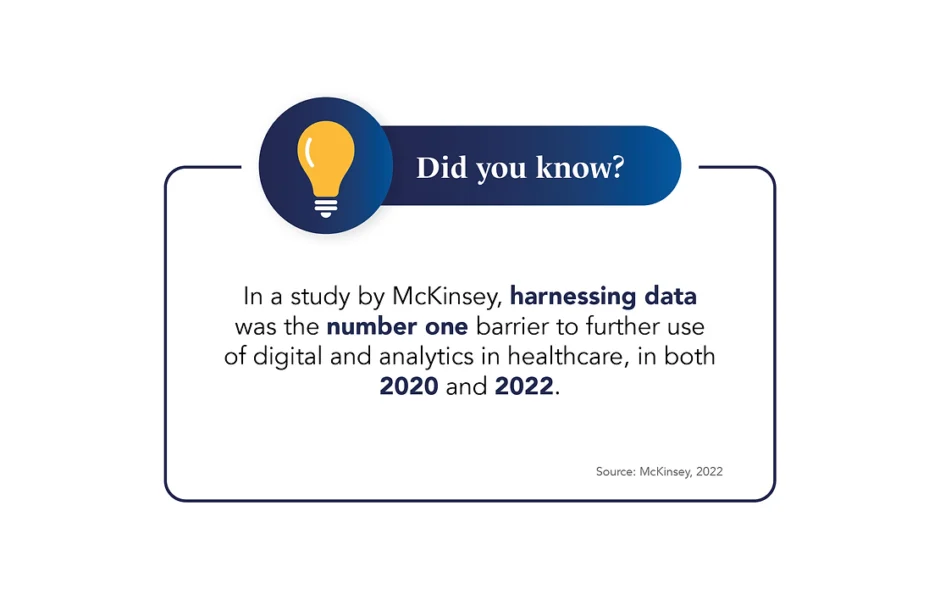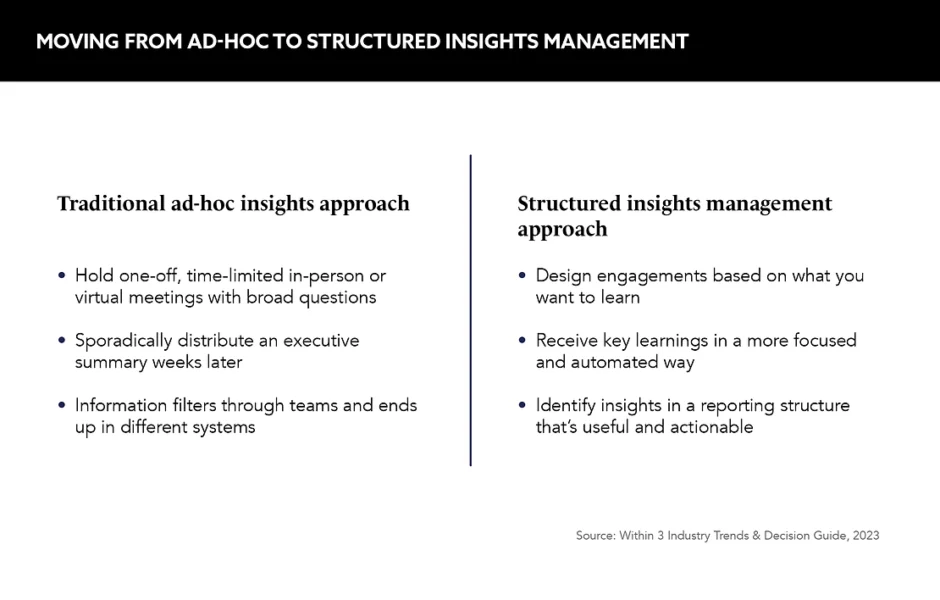How can medical affairs achieve efficiencies by standardising and modernising its insight gathering processes?
Words by Saša Janković
As any medical affairs team will vouch, they are no stranger to gathering data and insights to inform their customer and patient strategies. However, the opportunities presented by data have grown significantly in recent years with the advent of social media and advancing analytics technologies, and many have yet to take full advantage.
Much like the drawer of paperwork we all have at home that we’re always meaning to sort out, many insights are lost because there’s no process for collecting, storing and analysing them effectively. The volume of data is also “growing exponentially”, notes Stephen Aherne, Pharmaceutical and Life Sciences Leader, PwC, and it shows no sign of slowing down.
As the pharmaceutical industry pursues a more data-fuelled, personalised approach to stakeholder engagement, a solution needs to be found. So, what are the challenges posed by the overwhelming amount of data and the need to extract meaningful insights from it?
Acknowledge barriers
Lance Hill, CEO, Within3, a life science insights management company, says a first step is for organisations to recognise that the way they handle insights isn’t working well. “It’s not for lack of information – in fact, data is proliferating at a pace many organisations find overwhelming,” he says, “but information, data points and observations aren’t insights.”

If data alone isn’t an insight, then what is? They are “pivotal points that impact strategic decisions”, explains Hill, and he warns against the risk of losing intelligence in documents, emails, meeting notes and transcripts. This can lead to “teams making decisions based on incomplete or outdated information”, he says, which is clearly not useful for any party.
One place where this is particularly prevalent is at medical congresses, notes Hill. He explains that despite lengthy preparation, vital information often fails to make it from the congress hall to the conference room. “Information shared at congresses heavily impacts the trajectory of product launches, [but] post-congress, many insights never make it past the collection stage, and thus won’t amount to anything.”
Information, data points and observations aren’t insights
Social media is another data stream that contains a deluge of information that needs careful handling, according to Tanmay Saraykar, Director, Offerings Management and Global Delivery – Social Media Intelligence, IQVIA. Far beyond an annual conference, customers and patients are sharing information online 24/7, all year round.
“The ubiquitous nature of social media makes it a prominent, easily accessible source of information for patients, caretakers and physicians,” confirms Saraykar. This is useful because it gives medical teams insight into existing products on demand, but it can also help them identify potential influencers to spread the word about new therapies.
As Saraykar describes: “Physicians who actively participate in social media content creation often gain influencer status and can consequently influence the healthcare decisions of their followers, including physicians.” They have “gained the power to influence the reputation of prescription drugs and OTC products”, he adds.
Step up social listening
The benefits of getting to grips with social media are many, and medical teams are increasingly turning to social listening to gain the insights that lie within, but many don’t find the process straightforward.
According to Saraykar, life sciences companies face significant challenges when it comes to social listening. On average, large companies have more than 40 brands across multiple therapeutic areas with moderate to high digital and social media activity.
Working with big data on so many different products can be overwhelming, and the fact that the data sets can be so diverse can also be problematic for teams. Social data can be complex, unstructured and unformatted, and it comes in different shapes and sizes, such as text, video, images, emoji and slang.
Data is proliferating at a pace many organisations find overwhelming
In addition, Saraykar adds, many social listening tools do not consolidate digital information beyond social media, providing an incomplete view of insights and making social data siloed. Lastly, he raises that different functions within pharma companies may prioritise social listening locally or on an as-needed basis, making it decentralised.
Find data analysis solutions
The solutions to all these issues can involve identifying chaotic processes, understanding pain points and using tools and platforms to streamline insight gathering processes.
This is pointed out by Richard Olsson, Founder and Managing Partner, ECT Technologies LLC, who says the first step to better analysing insights is to collect them “more effectively and efficiently” in the first place. He suggests that companies can begin collecting better insights by training medical science liaisons (MSLs) to identify what constitutes an insight.
In his view, an insight is observed knowledge of the healthcare environment qualified with a thought leader’s interpretation and opinion. It also must hit three key criteria.
Olsson also believes that insights should align with a company’s key medical strategies, be independent from a CRM system and be input into a “well-thought out and simple-to-use collection app” to increase the quality of collected insights and facilitate analysis.
While a field-based medical team is the primary source of insights, almost every discipline within medical affairs has the power to collect valuable medical insights in the course of their work, so casting a wide net is important to avoid overlooking crucial information.

Olsson concludes by stressing the importance of promoting a culture of transparency. This can allow MSLs to learn what good insights look like and help them feel safe to share insights – good or bad, so that there is continuous feedback flowing into the organisation.
“Forward-thinking pharmaceutical and life sciences companies can harness emerging technologies to assist with insight gathering and operational improvements,” adds Aherne. “By using AI tools, it is possible to develop a tech-enabled roadmap that accelerates a company’s transformation.” Artificial intelligence can be used to collect, organise and extract insights. For many companies, wider use of this technology is on the horizon.
Insights are an incredibly valuable commodity, and the decision to use AI to unearth them could separate the wheat from the chaff in terms of business transformation. Now if only there was an AI that could organise that filing drawer.









